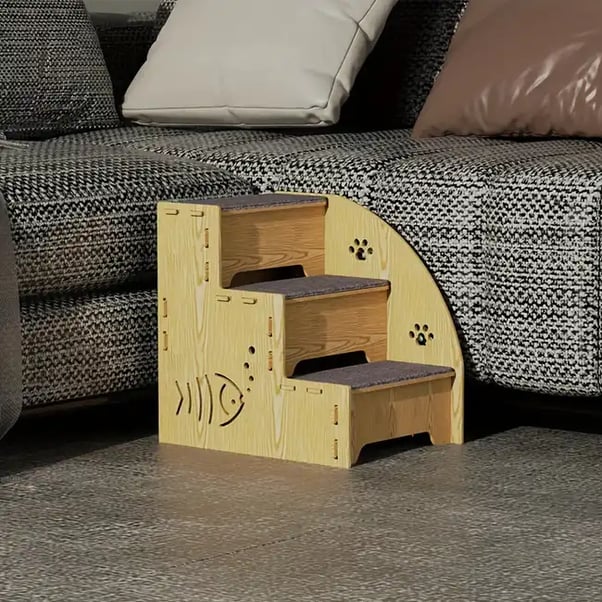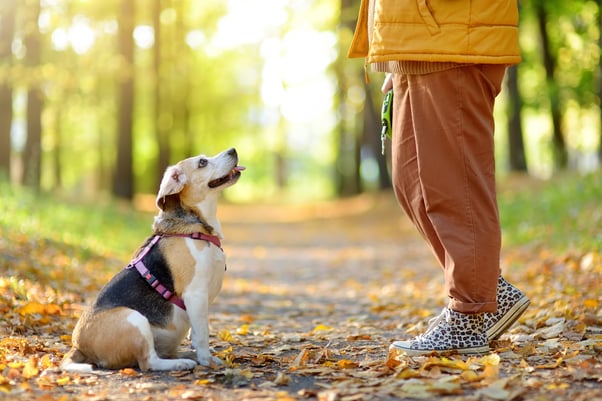This article will help you adapt your dog’s environment, as well as your care practices, so that your dog feels as comfortable as possible regardless of their illness.
What is a Suitable Environment for a Dog?
To ensure your dog's well-being, it is essential to adapt their environment in the following ways:
Easy access to food
Senior dogs often suffer from periodontal disease, which can make eating difficult. Regularly check your dog's mouth with your veterinarian and adjust their diet to make eating easier.
The way you provide food can also make a big difference. Dogs usually eat quickly, so there are multiple devices to slow them down, from refillable toys to slow feeders and snuffle mats. If your dog has mobility issues, dispensers are a good option. If they can stand for a while, the snuffle mat is the best choice.

Easy access to water
Ensure your dog always has close access to water without physical barriers like steps. For the most suitable environment for your dog, we recommend having a drinking spot in every room they frequently use.
Resource use
Observe how your dog uses their space. If they avoid certain areas, it may be due to a lack of resources like beds or hiding spots, or difficulty accessing them. Provide accessible rest areas and hiding spots to make use of all available space.

Save haven
Creating a safe haven within your dog’s environment is essential, especially if there are children in the family. They should be pleasant places where your dog can isolate and rest without being disturbed. Provide safety zones in various parts of the house and remind family members not to touch your dog while they are in these areas.
Observation areas
Dogs enjoy observing their surroundings. Create an accessible resting area where they can look outside. This can be comforting and entertaining, especially if your dog has mobility issues.
Quiet environment
Try to maintain a calm environment to reduce your dog's stress.
Walks
Walks should always be a moment of relaxation and positivity for both you and your dog. Adapt the walk to your dog's physical abilities, adjusting the pace and keeping in mind that sniffing is the most important goal. Incorporate breaks so they can observe their surroundings and avoid situations that might overwhelm them, like areas with many dogs.

Adapting How You Care for a Dog with Medical Problems
For dogs with medical problems and issues, proper and predictable care management is crucial. Consider adapting these areas when caring for your dog:
- Routine: Try to maintain a consistent routine for all your dog’s needs, from feeding times to administering medications. This helps your dog anticipate what will happen and feel more comfortable.
- Signal Interactions: Clearly differentiate between pleasant interactions and medical manipulations. Use specific signals for each type of interaction. For example, before petting your dog, always use a hand signal and a verbal cue. For medical procedures, place a small towel in front of them. This way, they can distinguish between moments of potential pain and pleasant interactions.
- Initiate Affection: If your dog is not feeling well, they might not seek out petting or play as often. Take the initiative to provide affection and attention.
Chronic illnesses may require specific care practices that also contribute to your dog's well-being. Consult with your trusted veterinarian and nurse for specialized advice. There are books and resources that offer guidelines on managing specific conditions such as vision loss and diabetes.
Otherwise, adopting these practices will help your dog maintain a good quality of life, even while dealing with medical problems. You will also feel more at ease knowing how to act. And remember, if you have any doubts, contact your veterinarian for help in providing the best care. If necessary, they can refer you to a behavioural medicine specialist for specific therapy.
Are you interested in learning more about caring for dogs and how we can create the best possible environment to support their well-being? Discover all our articles online with a range of tips from our wonderful team of Happy Dog Experts! You can also get in touch to ask any questions or stay informed with all our latest news by signing up to our newsletter.


